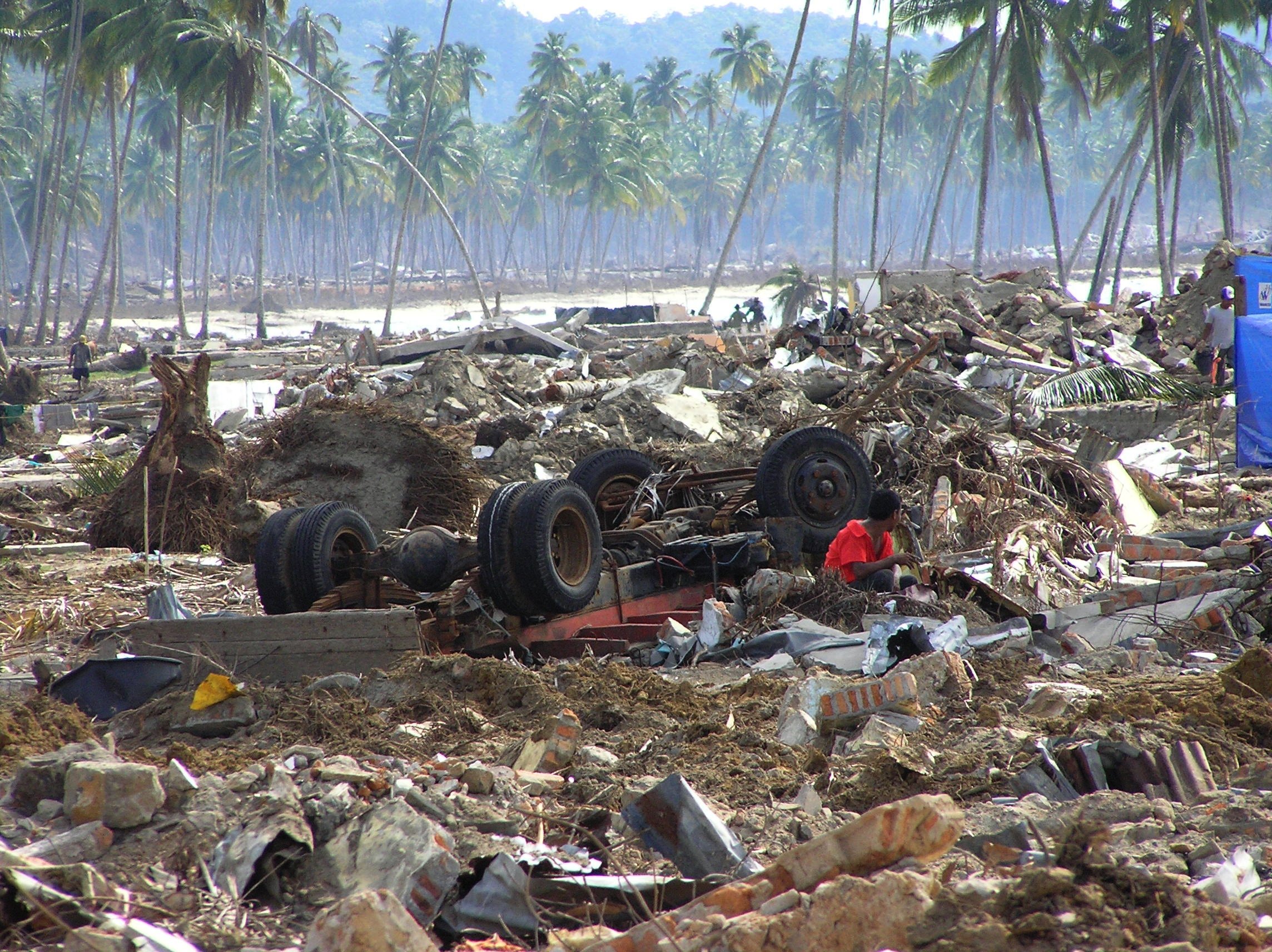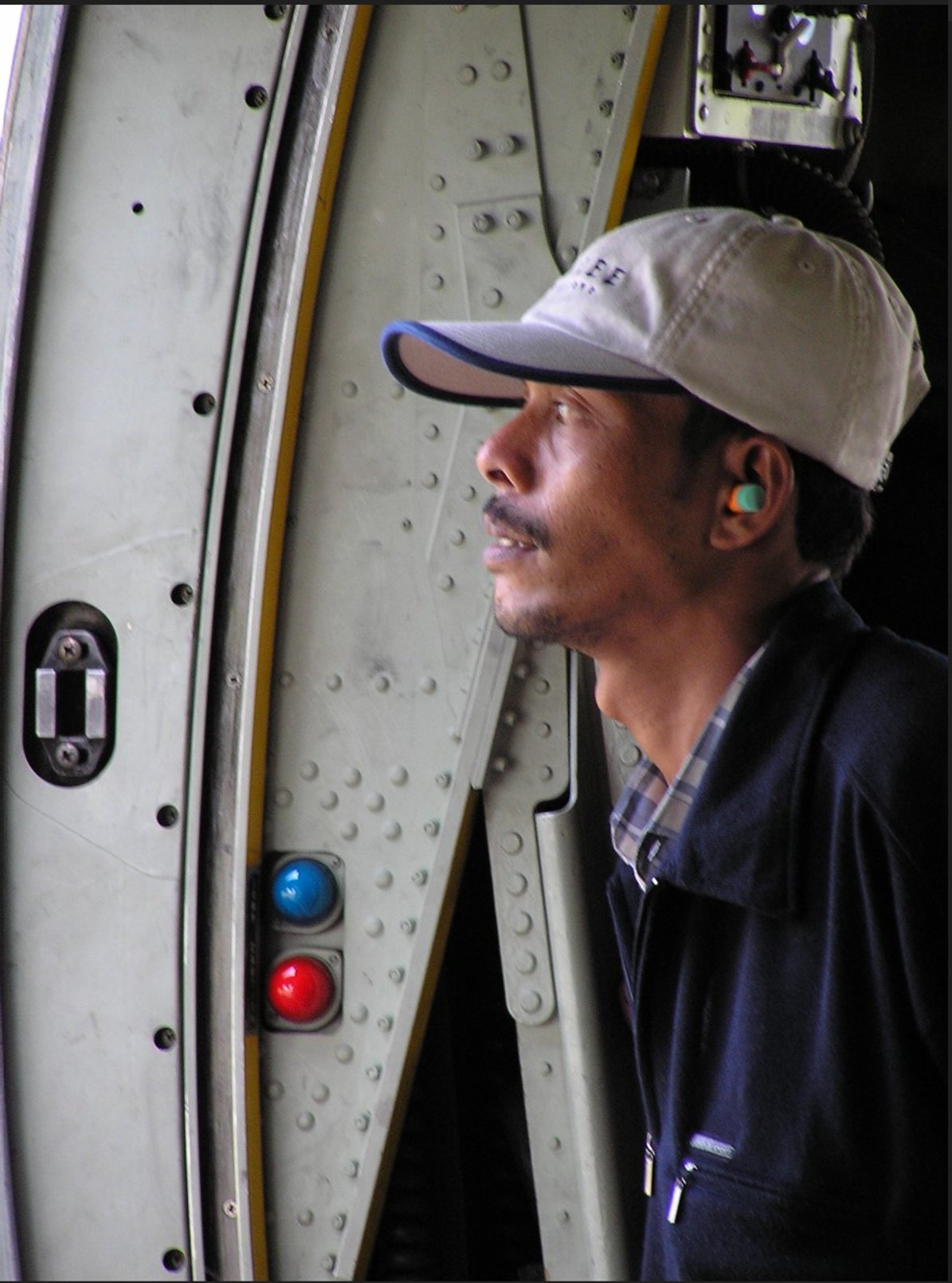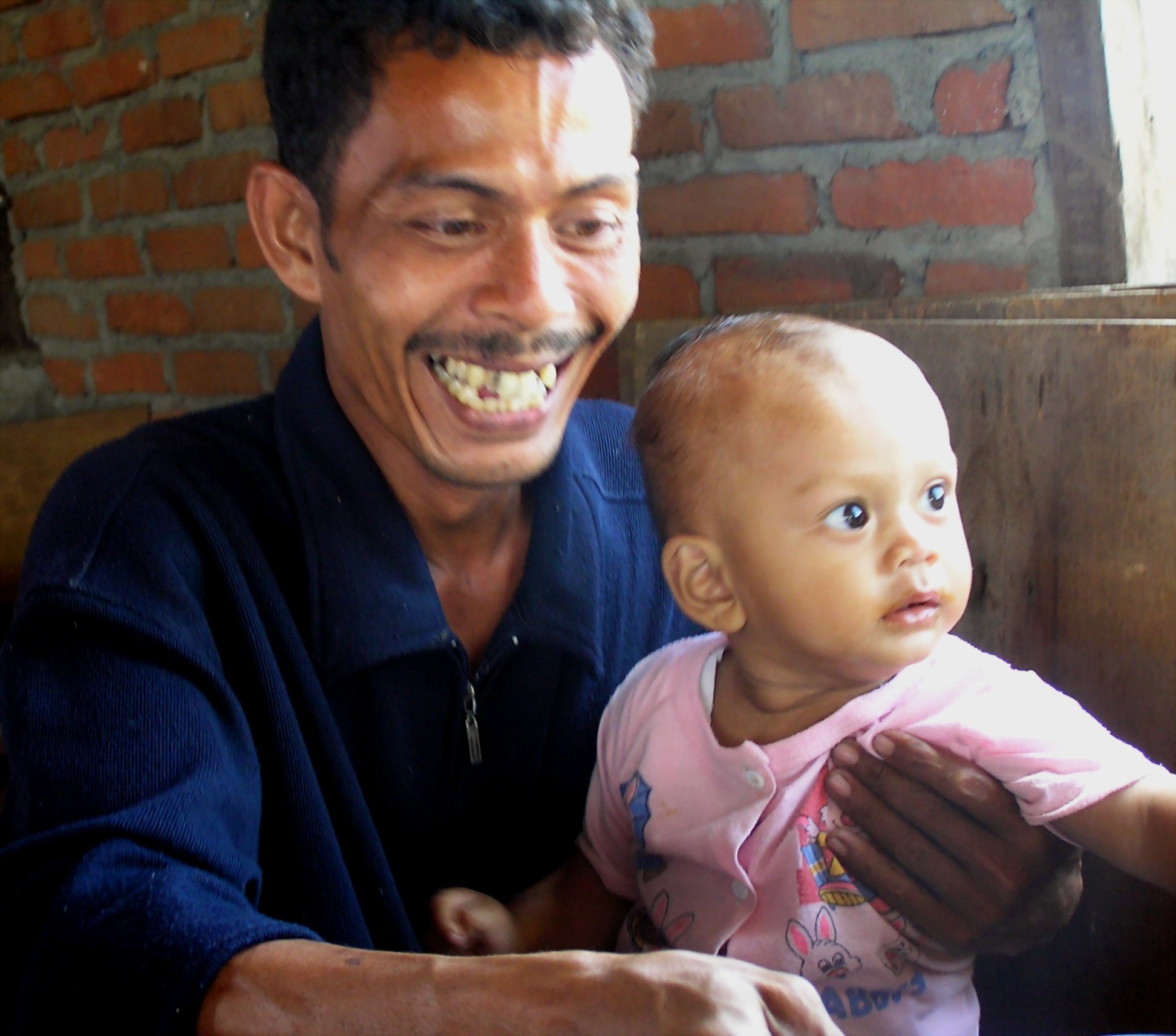Journey to Aceh
the Start of Chance International
Natascha Barrymore
“I never had any intention of going into aid work, nor did I have any experience; I had never even heard of Aceh and had no idea there had been a 30 year conflict. Watching the events of the tsunami unfold on my television in Greece, I could not pull myself away from it to part take in the Christmas/ New Year celebrations that were taking place around me. It seemed as though they had no meaning, the true message had been lost as had the lives of so many. As the death tolls climbed by the hour and the repeated message came across that there was an incredible lack of organisation the thought flashed through my mind I should go there and help.
After contacting every agency that was accepting donations and being rejected by all for not having the experience or qualifications, I decided to go alone, pack a rucksack and book a flight. People have often said I was brave; brave is knowing what you are going to face and continuing none the less - I was naïve. I had no idea what I was going to face or survive. I just knew I had to do something, I could not sit back and just watch. I chose Aceh because it was the worst affected and did not have the infrastructure of Thailand or the population of India.
The journey there was an adventure in itself with the plane being refused landing permission in Banda Aceh and being diverted to Thailand. This accidental occurrence led me to meet Hamdani, who later gave me an understanding of the social structure of Aceh, finding large communities with out aid, and friendships that will last a lifetime, even though we did not have a common language and everything was communicated through hands and feet.
On the first night in Banda Aceh, Hamdani taught me something that was to change my life. Arriving in Banda Aceh with 450kg of medicines and no idea where to go, yet alone transport and language skills, Hamdani stayed by my side. Once I had arrived at a hospital and delivered my goods and begged to camp down there for a night, I turned my attention to Hamdani who was still by my side. Was I now responsible for him? Did I have to pay him? Finding a translator to aid communication, it transpired that his plan had been to search for family the moment he arrived in Banda Aceh, but he saw I needed help and did not want to leave me until he was sure I was safe. Now that I was, he would go and search to see if he could find anyone from his family. His wife, 7 months pregnant with their first child, had been ripped from his arms by the waves. He never found her body. I had just experienced a complete stranger putting my welfare above his own family. As Hamdani left me in search of any family I was left wondering if I would do that for a friend yet alone a stranger.
As the days passed and I was able to help some people in camps, the Afghan Medical team arrived and asked me to coordinate them as I had been in Aceh a few days longer than them. It gave me a purpose to access the NGO meetings and mix with the international community. The first project that I embarked on was teaming up the Afghan team who lacked transport and medicines, with the Turkish team which lacked doctors but had cars and medicines.
Hamdani had taken me to his camp which I later learned was in a rebel area and so had been given no aid or doctors. He asked me if I could bring a team to look at the 600+ people there. That became the first of many medial trips with the combined efforts of the Turkish/Afghan medical teams into restricted conflict areas. It seemed strange that it was so easy to arrange this; we would usually have 5 or 6 doctors and a couple of nurses treating all day, every day. It was however early days and chaos still reigned with 1000’s of bodies being found on a daily basis. So it would be difficult not to find a way to help.
One of the cars would always have lots of note books and pencils so that they could be distributed in the camps to enable makeshift schooling to commence - as some kind of normality had to be established for the children to start coping with the trauma.
I was then approached to work for a Canadian NGO on a permanent basis. Overjoyed that this was something that I could now do long term, and with the belief that the backing of an NGO would enable me to help so many people, I thought it a dream come true. But I was soon drawn back to helping people wherever I could in the camps and medical centres, realising the hands-on approach was more for me.
It is was at this point that Suci came into my life. Her father had been seeking help for weeks for her extreme hydrocephalous and the best he had gotten was a promise of an operation in Germany but no help for the flights or accommodation whilst there. I had to do something. A friend and I found funding for an operation, doctors and flights and got her to Jakarta to the best possible care. Within 24hrs of taking her out, I received information and pleas for help for 7 other children with the same condition. Something needed to be done.
Funding was found from Metro TV a large media group in Jakarta, and a system was set up that any child found with heart or head conditions could be sent to a Jakarta or Medan hospital for treatment immediately. The local doctors were in direct contact with the specialist in Jakarta and Medan, so that they were fully informed for after care of the patients or any problems which may have emerged.
A Hungarian medical team found me and complained that they were placed in a camp treating minor ailments when they were actually a full surgical team. A few phone calls later I had arranged for them to go to an island that had lost its surgeon in the tsunami and had a huge waiting list of patients in need of operations. The next day they were operating, incredibly happy that they were doing what they had come out to do - help people. With the combination of the system set up for children’s operations and the Hungarian team, 156 operations were carried out.
I found the key to anything in aid work in Aceh was the communication between agencies and the pooling of resources. By tying to promote communication and sharing of resources, I found that the smaller and local NGOs were able to do so much together. I became the kind of link for them. Whether it was someone trying to find tents or hygiene kits or a home for fishing boats, sharing information and resources made things happen.
I began wearing a headscarf on my first morning and felt very comfortable moving within the Acehnese community. Living with a family in a tsunami damaged house, I was easily accepted and became known as the foreigner with the scarf. I spent a lot of time finding the needs of communities that did not have access to the international aid agencies and either brought the aid to them or opened doors for them to access it themselves.
I worked for 8 months with only one day off during that time, I can honestly say I do not remember all the things that I did as I was usually working on about 20 projects at a time. Listing the things that I did will have little meaning to those reading this - they ranged between starting the Rotary Club in Banda Aceh to scanning an ID card and printing a photo enlarged so a widower could have a photo of his lost wife, to bringing scarves to women in remote camps, so that the women would be able to search for family in the town, to giving 10 pounds to a woman looking after two orphans to buy bananas and equipment to sell fried bananas so she could buy food to feed them.
One will always remain with me, it is the story of Hamdani who had taught me so much about humanity, friendship and humility. One day he arrived with the idea that he would cook and sell food from his friend’s coffee shop near his old home of which remained only the foundations. In his hand he had a list of things that he needed to start his business and a request for money. When asked if they were real prices or estimates, he told me estimates. I sent him away to find out the actual prices, telling him that a donor was Acehnese and would check and if she found one item cheaper he would receive no money at all. A couple of days later he arrived with the revised price list which was actually more than he had at first requested. Paid in a couple of instalments, he bought all the things he needed and collected tsunami debris to build the kitchen at the back of the coffee shop. A couple of weeks later he came to me to tell me that he would be ready in three days. I arranged for a few foreigners to come with me to the opening, mainly to show them how things could be done. By asking people what help they needed, not by giving what help I thought they needed, and listening to their ideas. Also to give him and the business a bit of status in the community, as it was unheard of that foreigners would eat in a place like that. What I did not know was that Hamdani was so nervous that he was going to let me down in front of those people that he did not sleep all night. The day was such a success and I ate one of the best meals I had eaten in Aceh. The success continued for him to employ 4 people and had women in the camp making sweets for him to sell. And best of all he remarried and has a son! Dependent on aid he sat in the temporary shelter, mourning the past waiting for something to happen to start his future. Giving him control of his future, he started living again.”
Natascha 2009








